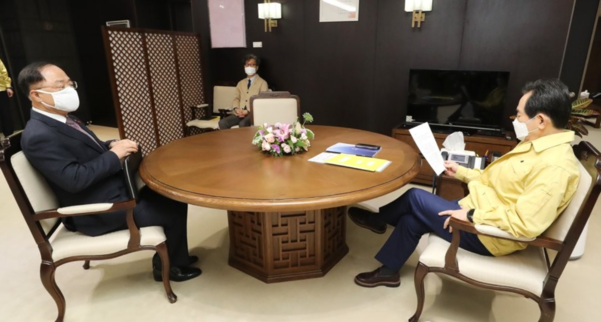Input 2021.01.27 14:06 | Revision 2021.01.27 15:07
Prime Minister Jeong Sye-gyun maintains prudence despite pressure from ruling party
“There is a need for a’relentless review’ such as compensation standards and financial resources.”
Prime Minister Jeong Sye-gyun took the lead and raised the need for the self-employment loss compensation system under the direction of President Moon Jae-in. Walked. It acknowledges the need to compensate for the losses of self-employed people who have limited business due to the government’s new coronavirus infection (Corona 19) quarantine measures, but emphasized the need to establish principles such as compensation standards.
Last year, they acted as if they adhered to the principle of emphasizing fiscal soundness regarding major issues such as the payment of national disaster support and a reduction of 300 million won in the taxation standard for large shareholders of stocks. In the end, the existing appearance of being dragged forcelessly to the demands of the Democratic Party along with the Blue House. Is a different move.
On the 27th, Deputy Prime Minister Hong presided over the Emergency Economic Central Countermeasure Headquarters Meeting and Innovation Growth Strategy Meeting at the Government Complex in Seoul on the 27th. “A calm review is necessary. After preparing a plan today and enacting it tomorrow, it is not allowed to pay the day after tomorrow,” he stressed.

Such a remark is as if after Prime Minister Chung Sye-gyun’s order to “review the legalization of the loss compensation system,” President Moon Jae-in ordered a review of the loss compensation system at a business report of related ministries on the 25th. It can be interpreted as being wary of the pouring out of media reports. He emphasized the position that there are many things to consider, such as the standard and method of compensation payment, although the instruction to systematically review the loss compensation system will be followed.
It is also interpreted that the point that Deputy Prime Minister Hong mentioned that this is a matter that requires a “relentless review” is against the arguments of the ruling party leadership and the People’s Power Emergency Response Committee Chairman Kim Jong-in that the relevant bill should be passed at the extraordinary assembly next month.
The officials note that on this day, Deputy Prime Minister Hong’s mention of the loss compensation system came out during the meeting. Since his inauguration in December 2018, Deputy Prime Minister Hong has held a number of meetings of economic ministers, but none of the meetings gave a message with a specific meaning in his remarks. Deputy Prime Minister Hong’s all remarks were filled with a summary of the agenda to be addressed at the meeting. Deputy Prime Minister Hong, who repeated the dry remarks such as’Summary of the press release’, expressed his feelings through all remarks at the meeting is evaluated as a significant change. This is interpreted as suggesting a strong will to put a brake on recent political discussions related to the loss compensation system.
In recent political circles, on the premise that self-employed people’s corona business suspension losses are compensated, the government has issued deficit Treasury bonds and then argued to raise funds through the’direct purchase’ of the Bank of Korea. There are many claims to preserve. On this day, Democratic Party’s third senator Lee Won-wook also insisted, “Let’s temporarily raise the value-added tax rate by 1~2% to provide financial resources for loss compensation.”
However, fiscal authorities such as Deputy Prime Minister Hong are negative about the plan to finance the Democratic Party’s loss compensation, which is proposed as a medium rescue method. Deputy Prime Minister Hong previously expressed a negative position, saying, “Financials are not anger and water,” and “excessive national debt is burdened by children’s generation.”
Since then, he made a statement that maintains this position even at the request of Prime Minister Chung and President Moon. This is the reason why people are being evaluated as being “different this time” compared to the state of being dragged by the ruling party or the Blue House in the standard of national disaster subsidies and major shareholders.
The reason why Deputy Prime Minister Hong argues that a’seamless review’ is necessary is that not only funding but also discussions on the standards for compensation for losses for self-employed persons can lead to various conflicts.
It is not only the self-employed that has suffered damage due to the new coronavirus infection (Corona 19) quarantine measures, but it is unreasonable to compensate for the loss only to the self-employed. In particular, this is because there are groups that have suffered economic damage from work cuts such as special type workers (special high school), daily workers, freelancers, and non-regular workers. Furthermore, it is difficult to measure the scale of losses due to Corona 19, and it is also a task to determine the compensation standards and methods accordingly. Depending on the compensation criteria, self-employed people may fall into a controversy over equity.
Economics predicts that it may cost up to 100 trillion won due to the nature of South Korea, where there are many self-employed people. If the loss compensation system is implemented with the state debt rapidly increasing due to the four additional additions last year, fiscal soundness concerns are high.
A high-ranking official at a private economic research institute said, “If you see that Deputy Prime Minister Hong is dragged away this time in a situation where there is no confidence that Korea’s fiscal soundness will be maintained, it will confirm that economic policy is dominated by politics and The perspectives of foreign investors will also change.”
